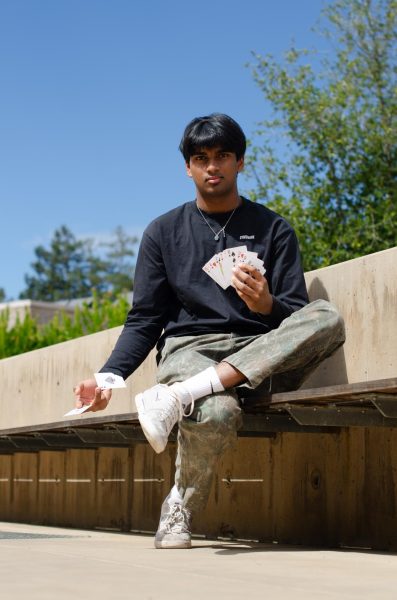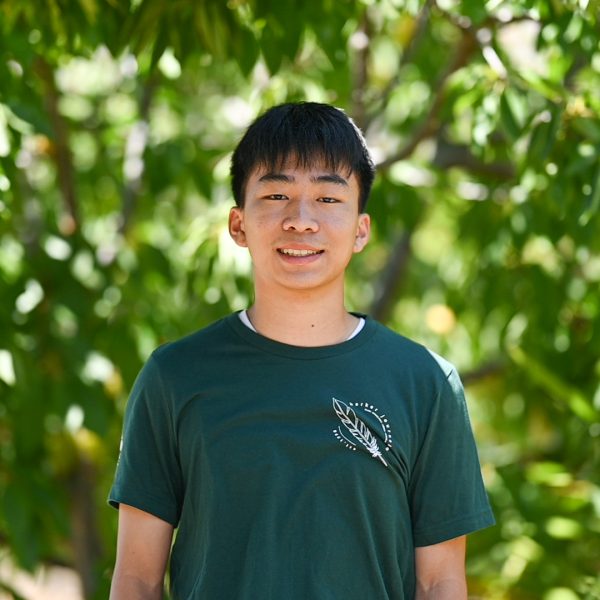
A cluster of six year olds gathered around senior Rahul Yalla, eyes wide and mouths open in disbelief as a card vanished into thin air. It was just a cousin’s birthday party, his first gig, but the wonder on everyone’s faces made it feel like something bigger.
For Rahul Yalla, magic and spikeball aren’t just hobbies. They’re ways to connect with friends and engage with the community around him. Whether he’s performing a magic trick or playing spikeball out on the field, senior Rahul Yalla creates an environment where everyone feels included. He promotes both competition and camaraderie, creating an environment where everyone can thrive together.
Rahul was initially inspired to pick up magic after watching a mesmerizing magic show, hoping to bring the same emotion in other people. He takes his craft seriously, constantly learning new tricks and performing at small gigs. To Rahul, magic goes beyond simple illusions and fast hands. Rather, it’s engaging with the audience, delighting in the reactions of awe and wonder he elicits.
“Magic is all about reading people’s faces and expressions,” Rahul said. “You have to jump at opportunities when they come or if you miss them the whole trick is ruined, and that’s how it is in real life too.”
For Rahul, spikeball also encapsulates quick decision skills and reactions to the moment. He noted that compared to typical sports like basketball or volleyball, spikeball is a much more spontaneous sport, without any plays or player positions. Similar to his approach to magic, Rahul thrives on reacting in split-second judgments, embracing the unpredictability of the sport.
“When you play spikeball, you have to make quick decisions,” Rahul said. “You have to understand how fast the game plays; you can’t have a rigid plan going into the game. In general in life, adaptability and quick decisions are important.”
Rahul’s creativity stretches beyond his quick thinking during spikeball games and the creation of his own magic tricks; when he sketches, he takes a loose, free hand approach. Instead of planning what he wishes to draw, he lets random lines and smudges guide him to a drawing.
“I use a graphite cube for sketching,” Rahul said. “Sometimes it just breaks and creates sharp lines through my drawing. Instead of erasing them, I incorporate them into my final drawing and create something unique.”
Rahul’s ability to adapt extends beyond his own experiences, influencing friends around him. Close friend Tej Aswani appreciates Rahul’s unorthodox thinking, finding that it positively impacts his life as well.
“He thinks outside of the box for a lot of things,” Tej said. “And sometimes you need that type of person around you to get different perceptions.”
Rahul understands that mastery doesn’t come quickly and nothing can be learned overnight. Whether it’s magic or spikeball, both require patience and persistence, qualities that Rahul applies across all areas of his life.
“You don’t start off good at anything,” Rahul said. “You have to take it day by day and not stress too much, whether it’s magic, spikeball, or anything else.”
Rahul combines competition with mastery, attributing the everyday contests with his friends for pushing him to improve. To him, competition isn’t just about outperforming everyone around him, but driving everyone around him to be better as well.
“I have a super competitive friend group, there is always one person trying to win,” Rahul said. “Being a twin, I’m also competing every second of life, for the front seat, driving the car. Competition is almost intrinsic at this point.”
Rahul’s confidence fuels his competitive nature, something which allows him to excel in his hobbies. Close friend Advay Monga appreciates Rahul’s unwavering belief in himself, sometimes leading to amusing stories.
“Rahul believes in himself a lot,” Advay said. “He’s very opinionated and has very strong beliefs. He says he can run faster than a plane and he still hasn’t admitted that he can’t.”
Rahul keeps this same fun attitude in academic settings where his amicable and approachable demeanor fosters a positive atmosphere in his classes. History teacher Chuck Witschorik attests to Rahul’s friendliness in his AP US History class, recounting his ability to work well in groups.
“Rahul would be talking with his group and they’d all be at ease,” Dr. Witschorik said. “He would tell a joke, make everyone feel comfortable — he made everyone feel happy to be in class.”
For all the competition Rahul brings to his life, he knows never to turn a competition into something destructive. Instead, he aims to motivate everyone around him to grow while keeping a smile on everyone’s faces. He believes that fierce competition and light-hearted fun can coexist — it’s this balance which Rahul values the most.
“I want to be known as someone who promotes competition but doesn’t make it to the point where it isn’t fun anymore,” Rahul said. “It’s making the people around me smile a bit more while keeping that same level of drive and competition to push us to get better.”




![LALC Vice President of External Affairs Raeanne Li (11) explains the International Phonetic Alphabet to attendees. "We decided to have more fun topics this year instead of just talking about the same things every year so our older members can also [enjoy],” Raeanne said.](https://harkeraquila.com/wp-content/uploads/2025/10/DSC_4627-1200x795.jpg)


















![“[Building nerf blasters] became this outlet of creativity for me that hasn't been matched by anything else. The process [of] making a build complete to your desire is such a painstakingly difficult process, but I've had to learn from [the skills needed from] soldering to proper painting. There's so many different options for everything, if you think about it, it exists. The best part is [that] if it doesn't exist, you can build it yourself," Ishaan Parate said.](https://harkeraquila.com/wp-content/uploads/2022/08/DSC_8149-900x604.jpg)




![“When I came into high school, I was ready to be a follower. But DECA was a game changer for me. It helped me overcome my fear of public speaking, and it's played such a major role in who I've become today. To be able to successfully lead a chapter of 150 students, an officer team and be one of the upperclassmen I once really admired is something I'm [really] proud of,” Anvitha Tummala ('21) said.](https://harkeraquila.com/wp-content/uploads/2021/07/Screen-Shot-2021-07-25-at-9.50.05-AM-900x594.png)







![“I think getting up in the morning and having a sense of purpose [is exciting]. I think without a certain amount of drive, life is kind of obsolete and mundane, and I think having that every single day is what makes each day unique and kind of makes life exciting,” Neymika Jain (12) said.](https://harkeraquila.com/wp-content/uploads/2017/06/Screen-Shot-2017-06-03-at-4.54.16-PM.png)








![“My slogan is ‘slow feet, don’t eat, and I’m hungry.’ You need to run fast to get where you are–you aren't going to get those championships if you aren't fast,” Angel Cervantes (12) said. “I want to do well in school on my tests and in track and win championships for my team. I live by that, [and] I can do that anywhere: in the classroom or on the field.”](https://harkeraquila.com/wp-content/uploads/2018/06/DSC5146-900x601.jpg)
![“[Volleyball has] taught me how to fall correctly, and another thing it taught is that you don’t have to be the best at something to be good at it. If you just hit the ball in a smart way, then it still scores points and you’re good at it. You could be a background player and still make a much bigger impact on the team than you would think,” Anya Gert (’20) said.](https://harkeraquila.com/wp-content/uploads/2020/06/AnnaGert_JinTuan_HoHPhotoEdited-600x900.jpeg)

![“I'm not nearly there yet, but [my confidence has] definitely been getting better since I was pretty shy and timid coming into Harker my freshman year. I know that there's a lot of people that are really confident in what they do, and I really admire them. Everyone's so driven and that has really pushed me to kind of try to find my own place in high school and be more confident,” Alyssa Huang (’20) said.](https://harkeraquila.com/wp-content/uploads/2020/06/AlyssaHuang_EmilyChen_HoHPhoto-900x749.jpeg)



